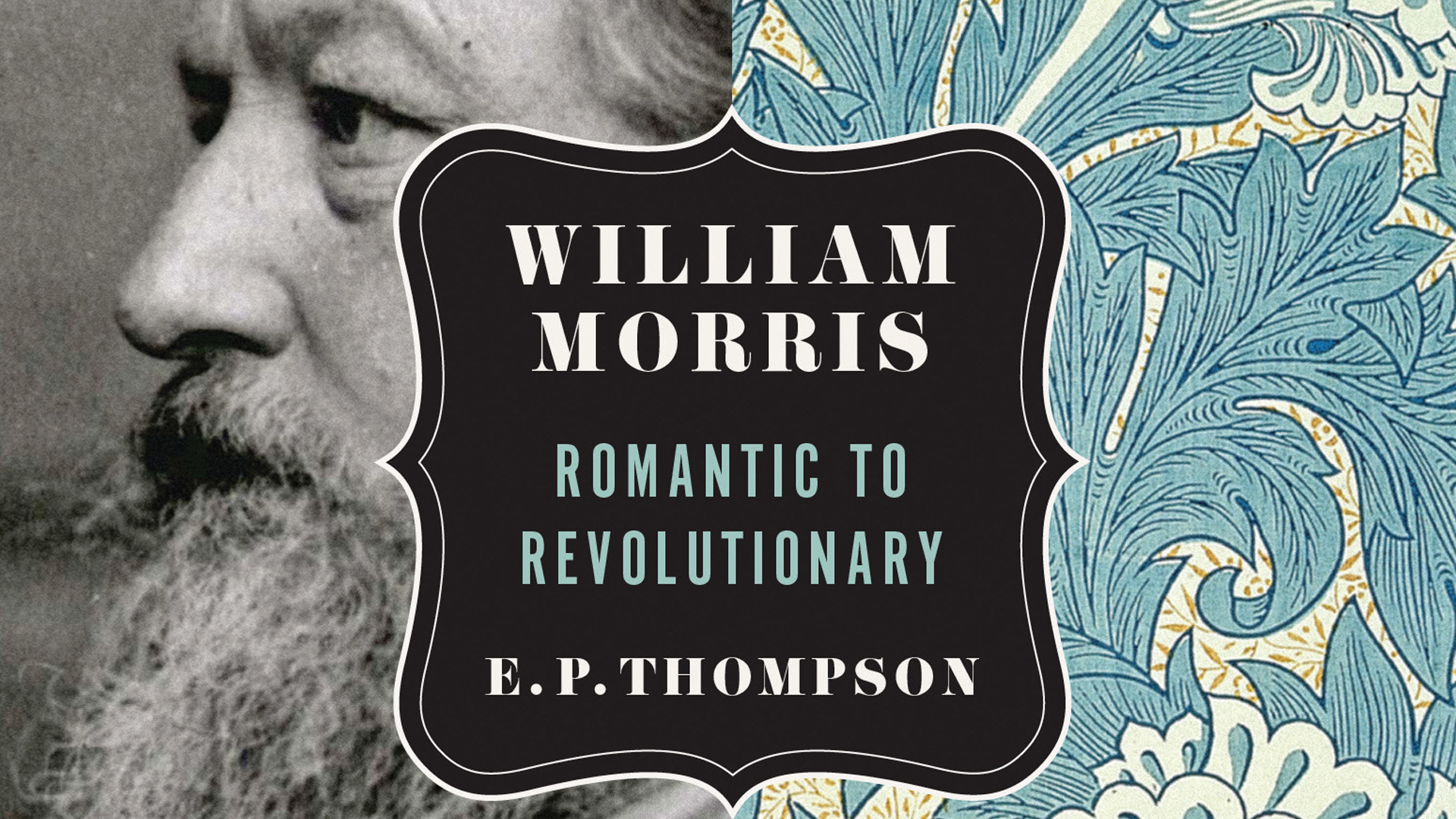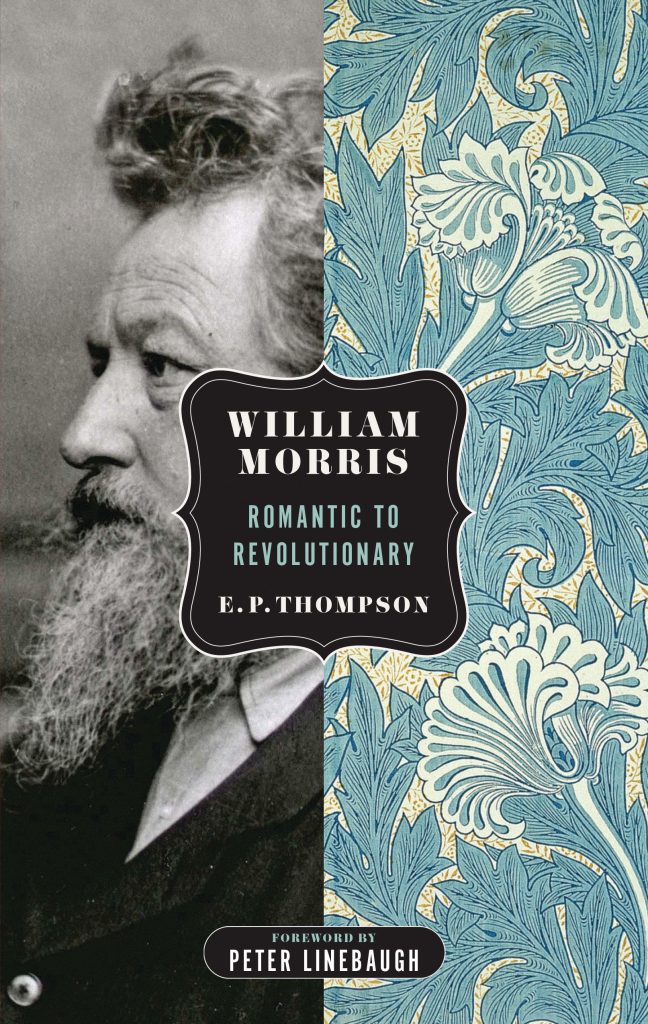by Sasha
Earth First
November 30, 2011
Earlier this year, PM Press released another monumental work—EP Thompson’s staple of British working class literature, William Morris: Romantic to Revolutionary. Originally published in 1955 and reworked in 1976, this thoroughgoing portrait of William Morris presents every critical nuance of his eclectic thought. Raised in an affluent 19th Century British family, Morris became attached to art and radical circles from a young age, rising in intellectual and aesthetic circles to become the design guru of London who changed the face of European socialism. Unlike his contemporaries, Marx and Bakunin, Morris settled in his home country, bringing to life his love of the land and nature to dismantle Victorian society that he had grown to know so well.
First as a noteworthy writer of poems and then as a famous designer of chintzes, wallpapers, and furniture, Morris brought the Romantic styles of the surfeited well-to-do aristocracy into a working class dynamic that reverberated with a nostalgic longing for nature and ease in a life structured by the violence of manners, class, and work. Embracing the myths, sagas, and epics of medieval Europe, Morris flew from the codes of the Age of Reason and the Enlightenment.
“Apart from the desire to produce beautiful things,” declared Morris, “the leading passion of my life has been and is hatred of modern civilization.”
So was Morris an anti-Civ primitivist? Herein lies the importance of this book today. William Morris certainly loathed civilization as it was represented by the Victorian charades of manners and charity of his day, and he associated himself with a group of people who identified with the label of “barbarians.” However, Morris also noted that the wealthy and alienated classes of his era, in their lofty circles, were also declaring themselves “barbarians” in their patronizing attempts to live free from moral codes. “’Civilization’ and ‘barbarism’ were terms which he always employed with ironic inversion,” states Thompson:
“’Civilization’ (he wrote to Georgie Burne-Jones in May 1885) ‘I know now is doomed to destruction . . . What a joy it is to think of it! And how often it consoles me to think of barbarism once more flooding the world, and real feelings and passions, however rudimentary, taking the place of our wretched hypocrisies. With this thought in my mind all the history of the past is lighted up and lives again to me. I used really to despair once because I thought what the idiots of our day call progress would go on perfecting itself.’”
Of paramount importance to Morris was what he deemed “morality,” which consisted of harmony in community, art, leisure, and nature.
But Morris was not against machines. “[I]t went without saying” says Thompson, “that a Socialist society would employ its scientific genius in finding means of eliminating smoke and filth, in disposing of rubbish and waste, and in preventing industry from blackening and despoiling the countryside.” Rather than casting off the importance of work entirely, Morris felt it necessary to make work easier. Most of all, he sought to bring manual laborers together with intellectuals and artists to forge a community where no single occupation could be valued over or under any other.
One of the most important causes that he involved himself in was the struggle against imperialism. With a keen insight into the people of England, Morris tore apart the jingoism of the British Empire, and spoke out at every opportunity against the imperial involvement from Eastern Europe to Africa and Asia. His lectures were popular, though unmarked by any pronounced personal affectations. “Perhaps if there is a dominant trait,” writes Thompson, “it is one of deep seriousness, combined with a total absence of affectation, a constant struggle to find the most direct honesty of expression.” In this sense, Morris found himself taking a no-compromise stance in the class struggle.
Absolutely opposing the concessions of the ruling class, Morris believed that Socialism could only come about through a violent revolution. “’Commercialism, competition, has sown the wind recklessly, and must reap the whirlwind’, he wrote in October 1883: ‘it has created the proletariat for its own interest, and its creation will and must destroy it: there is no other force which can do so.’” For Morris, Socialism would not come about at once. A gradual process of return to nature and an enjoyment of life would take place as people escaped the cities and moved into small collectives that relied on the land. Using his life as an example, Morris built up his own workshop as a simple, deliberately anachronistic brick house, producing simple, affordable, floral patterns based on medieval motifs for popular consumption. In today’s world, where patterns adorning every package and every commodity entrap the consumer’s consciousness into an endless sea of distraction and market objectification, it’s important to remember that Morris’s floral patterns were a breakthrough in their day—when every aesthetic object directed the observer to a self-conscious game of manners lodged in the game of accumulation, Morris’s patterns freed the mind to contemplate nature, liberty, and the wild refuges of the imagination.
Although his political endeavors were arguably less effective than his artistic interventions, Morris managed to garner popular support behind his various projects, from Anti-Scrape (a historic preservation society) to the foundation of the Socialist League to his personal involvement in a workers’ movement that would culminate in the Bloody Sunday police riot of 1887. Perhaps Morris’s most interesting accomplishment was the bridges of solidarity that he helped construct between his own Socialist League, Irish political movements, Anarchist Communists, and Anarchists. “On one point Morris acknowledged his sympathy with the ‘Anarchist-Communist’ position”, Thompson writes, “by temperament he was opposed to a great industrial civilization, centered on large towns, and he looked forward impatiently to the re-emergence in Communist society of a life based upon small communes and villages. But he took pains to differentiate this speculative question from more essential matters of Socialist theory: indeed, it was from this region that he drew one of his examples of the necessity for individual submission to collective decisions, as it affected his temperament.”
Particular among his concerns was that a post-revolutionary society would react to the fear of starvation by completely destroying the forests and fields of the countryside. While the Anarchists would eventually push him out of his own Socialist League and its influential journal, the Commonweal, which he had edited for the duration of its five year existence, his influence only grew as he finished his days.
So weighty is the legacy of William Morris that it is claimed today by Marixists, Anarchists, Liberals, and Conservatives alike. The brilliance of E.P. Thompson’s writing is that he exposes how Morris’s ideas were embodied in his life’s complexities, and belonged to no one but himself. Making vital insights into Morris’s character and thought on virtually every page, Thompson carefully unravels the history of a complicated person in a complicated time.
Readers from any political tendency will find familiar comforts within Morris’s broad, ranging ideology, and sympathy for his personal triumphs and defeats. At a sparing 810 pages, this penetrating and perspicuous volume stands with Joseph Frank’s biography of Fyodor Dostoevsky as among the greatest biographies of the most distinguished of thinkers. Just don’t drop it on your foot!







